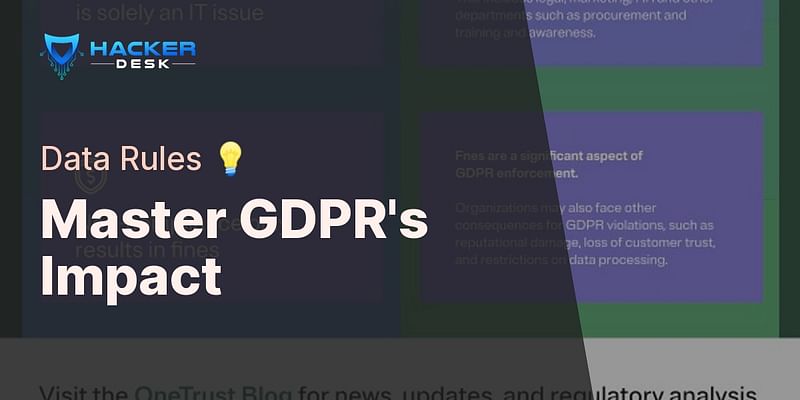Maya Braun is a seasoned expert in the realm of cryptography, driven by a profound interest in data privacy. Her professional journey has been dedicated to the design and development of secure communication systems, while also being a vocal advocate for digital rights. Maya takes pleasure in penning down her thoughts on the latest breakthroughs in cryptography and their potential impacts on privacy.
The General Data Protection Regulation (GDPR) is a comprehensive data protection law that was implemented by the European Union (EU) in May 2018. Its purpose is to safeguard the personal data of individuals within the EU and regulate how businesses handle and process this data. The GDPR applies to all organizations, regardless of their location, that collect, store, or process personal data of EU citizens.
The impact of GDPR on businesses is significant. It introduces a range of rights and obligations that organizations must adhere to in order to protect the privacy and security of personal data. Here are some key aspects of GDPR and how they affect businesses:
1. Data Protection Principles: GDPR establishes a set of principles that organizations must follow when handling personal data. These principles include transparency, purpose limitation, data minimization, accuracy, storage limitation, integrity, and confidentiality. Businesses need to ensure that they comply with these principles throughout their data processing activities.
2. Consent: GDPR requires organizations to obtain explicit and informed consent from individuals before collecting and processing their personal data. This means businesses must clearly explain the purpose of data collection and obtain consent through an affirmative action, such as ticking a box. Additionally, individuals have the right to withdraw their consent at any time.
3. Data Breach Notification: GDPR mandates that businesses report any data breaches to the relevant supervisory authority within 72 hours of becoming aware of the breach. If the breach poses a high risk to individuals' rights and freedoms, the affected individuals must also be notified without undue delay. Organizations must have robust incident response plans in place to handle data breaches effectively.
4. Individual Rights: GDPR grants individuals several rights concerning their personal data. These rights include the right to access their data, rectify inaccuracies, erase their data (the "right to be forgotten"), restrict processing, data portability, and object to processing. Businesses must have processes in place to handle these requests and respond within one month.
5. Data Protection Impact Assessments (DPIAs): GDPR requires organizations to conduct DPIAs for high-risk data processing activities. A DPIA helps identify and minimize data protection risks. It is particularly relevant for businesses involved in large-scale processing, profiling, or processing sensitive data. Organizations must document the DPIA process and consult the supervisory authority if necessary.
6. Penalties: Non-compliance with GDPR can result in severe penalties. Organizations can be fined up to 4% of their global annual turnover or €20 million, whichever is higher. These penalties are intended to ensure that businesses take data protection seriously and prioritize the privacy and security of individuals' personal data.
In conclusion, the GDPR has a significant impact on businesses by introducing stringent data protection obligations and empowering individuals with greater control over their personal data. Compliance with GDPR is essential for organizations that handle personal data, as it not only helps protect individuals' privacy but also enhances the reputation and trustworthiness of businesses in the digital world.














